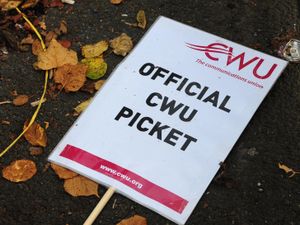Lecturers, teachers and Royal Mail workers strike in one of biggest walkouts
Picket lines are being mounted outside postal delivery and sorting offices, universities and schools.

Royal Mail workers, university lecturers and teachers are walking out on strike as industrial unrest continues to spread across the country in disputes over pay, jobs and conditions.
Picket lines are being mounted outside postal delivery and sorting offices, universities and schools as unions edge closer to co-ordinated industrial action.
It will be one of the biggest walkouts of the year.
Talks have been held between leaders of unions involved in the disputes with the aim of taking joint action, such as holding strikes on the same day.
Around 70,000 members of the University and College Union (UCU) will strike on Thursday and Friday, and again on Wednesday November 30, in a dispute over pay, pensions and contracts.
It will be the biggest strike of its kind, affecting an estimated 2.5 million students, with the union warning of escalated action in the new year if the row is not resolved.
The union says lecturers and other academic staff have suffered a decade of below-inflation pay rises, with a 3% increase announced in the summer.
UCU general secretary Jo Grady said: “University staff are taking the biggest strike action in the history of higher education. They have had enough of falling pay, pension cuts and gig economy working conditions – all whilst vice-chancellors enjoy lottery-win salaries and live it up in their grace and favour mansions.
“Staff are burnt out, but they are fighting back and they will bring the whole sector to a standstill.
“Vice-chancellors only have themselves to blame. Their woeful leadership has led to the biggest vote for strike action ever in our sector.
“Students are standing with staff because they know this can’t go on, and they know that a sector which generates tens of billions of pounds each year from tuition fees can afford to treat its staff fairly.
“Further disruption can be avoided if the concerns of staff are addressed with urgency. But the overpaid vice-chancellors killing our sector should be under no illusion – 70,000 dedicated university workers are ready to take even bigger action in the new year.”
Chloe Field, National Union of Students vice president for higher education, said: “Students stand in solidarity with university staff going on strike.
“We have always been clear that staff working conditions are students’ learning conditions, and for more than a decade both have come under attack from a sector that puts profits above education.”
Members of the Communication Workers Union (CWU) at the Royal Mail will also strike on Thursday and on Black Friday, one of the busiest days of the year for delivery companies.
A series of strikes is also planned in December, including Christmas Eve, in one of the longest-running disputes of a year dominated by stoppages.
Royal Mail said it has made its “best and final offer” aimed at resolving the dispute, including “extensive improvements” made during negotiations with the CWU, such as an enhanced pay deal of up to 9% over 18 months, offering to develop a new profit share scheme for employees, and making voluntary redundancy terms more generous.
CWU general secretary Dave Ward said: “We are disappointed that instead of reaching a compromise to avoid major disruption, Royal Mail have chosen to pursue such an aggressive strategy.
“We will not accept that 115,000 Royal Mail workers – the people who kept us connected during the pandemic, and made millions in profit for bosses and shareholders – take such a devastating blow to their livelihoods.
“These proposals spell the end of Royal Mail as we know it and its degradation from a national institution into an unreliable, Uber-style gig economy company.
“Make no mistake about it, British postal workers are facing an Armageddon moment.
“We urge every member of the public to stand with their postie, and back them like never before.”
Members of the Educational Institute of Scotland (EIS) will walk out on Thursday in the first national strike over pay for almost 40 years, with the action by teachers expected to close the majority of schools across Scotland.
A last-ditch offer made on Tuesday in a bid to avert strike action would see the lowest paid staff receive a 6.85% increase, with most getting 5%.
That was rejected by the EIS, and its general secretary, Andrea Bradley, branded it an “inept rehash” of the offer made earlier this year.
Meanwhile, Mick Lynch, general secretary of the Rail, Maritime and Transport (RMT) union will meet Transport Secretary Mark Harper ahead of a fresh round of train strikes set to cripple services across the country over the festive period.
Mr Harper said he hopes for a “sensible conversation” with the RMT but that he will not negotiate with the union, adding: “That’s very clearly for the trade unions and the employers – Network Rail and the train operating companies.
“But I do think in this case it’s important to meet with the unions. These strikes are not just about pay, this is about long-running talks that are actually about delivering rail reform.”



